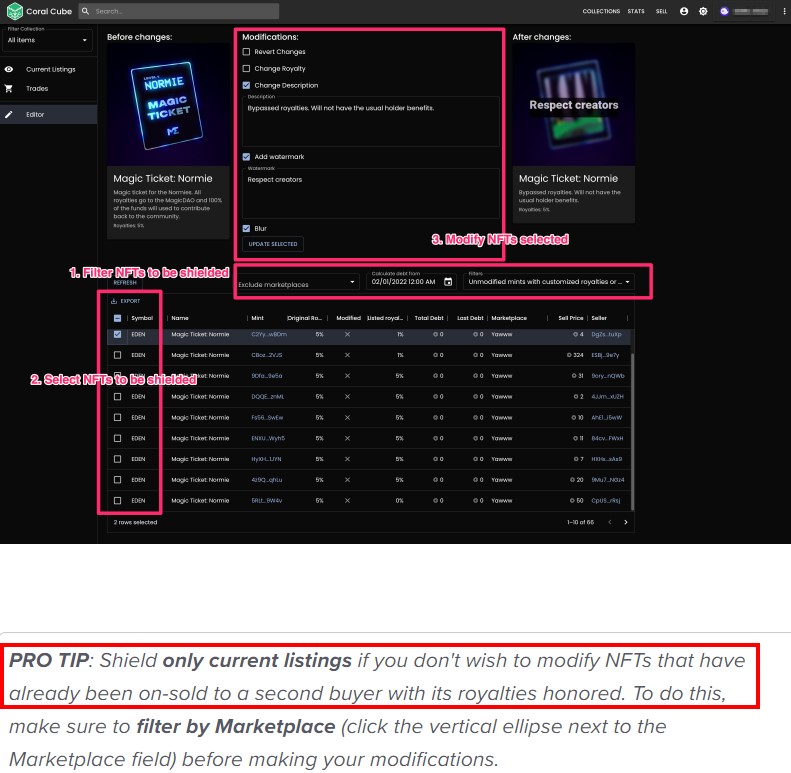MetaShield allows creators to flag or blur the images of listed NFTs that bypass royalties. According to Magic Eden, the move is necessary to protect creators’ royalties. Once a “shielded” NFT is bought, it would incur a debt for your unpaid royalty. Only those who pay off the debts can “unshield” the affected NFTs.
What you need to know about Magic Eden’s new royalty enforcement tool
Magic Eden, the leading NFT marketplace on Solana, has teamed up with NFT platform CoralCube to launch MetaShield. It is a royalty enforcement tool that allows creators to flag or blur the images of NFTs trading at zero royalties.
Needless to say, the announcement has created much uproar on NFT Twitter. Many see MetaShield as a means to punish buyers for the sake of protecting creators’ royalties. But is that really the situation? Let’s learn more.
According to Magic Eden, MetaShield is a tool that allows creators to track Solana NFTs listed with custom royalties. Suppose they find any listed NFTs that bypass royalties, creators can take actions such as updating the metadata, flagging the NFT, as well as blurring the images.


The company explained that creators can only modify listed NFTs, not bought NFTs. Instead of punishing the buyers, the shielding acts as a warning to potential buyers about the zero-royalty NFT.
When a “shielded” NFT is bought, it will incur a debt for your unpaid royalty. Only those who pay off the debts can “unshield” the affected tokens.
🧵/ Launching MetaShield:
Royalties are an important revenue stream that supports creators and enables them to grow their projects. These royalties are being threatened by marketplaces allowing collectors to set custom royalties. pic.twitter.com/zoSbd7W1Mf
– Magic Eden 🪄 (@MagicEden) September 13, 2022
7/ Does MetaShield punish buyers? No.
Creators can modify *listed* NFTs, not bought NFTs. This targets sellers who list on 0 royalty mktplaces & *warns* buyers they’re buying an NFT with 0 royalties. No debts are incurred unless a buyer purchases a clearly shielded NFT.
– Magic Eden 🪄 (@MagicEden) September 13, 2022
What does the community say about MetaShield?
The latest update by Magic Eden clearly doesn’t sit well with many NFT buyers in the space. Some are worried about newcomers who may unknowingly purchase soon-to-be shielded NFTs. This is a warranted concern as the user guide of MetaShield implies that creators may, in fact, modify sold NFTs as well.
 Apparently, creators can also modify sold NFTs using MetaShield. Source: Magic Eden.
Apparently, creators can also modify sold NFTs using MetaShield. Source: Magic Eden.
The announcement also led to a few arguments about immutability. For instance, Twitter user Relick.* thinks Magic Eden is going against a vital aspect of blockchain tech:
“While creator royalties are important, this metadata alteration goes against the immutable emphasis in the blockchain. Moving this direction basically implies that consumers don’t actually ‘own’ their NFT, only a pointer for some metadata. Appears to be a regressive move imo.”
While NFTs aren’t necessarily immutable, many buyers simply don’t just like the notion of experiencing to cover potentially overcharged royalties together with the 2% trading fees on Magic Eden. Exactly like what Twitter user OneEngineer said: “People wouldn’t be attempting to avoid fees and royalties if fees and royalties were reasonable. Begin by cutting your fees to 0.5%.”
Nonetheless, the business believes that protecting creators’ interests may be the right move to make. Aside from MetaShield, Magic Eden could keep exploring other ideas aswell to solve the royalty issue.